(All rights belong to their owners. Images used here for review purposes only.)
C.M.B., vol. 35, by Katou Motohiro. Grade: B
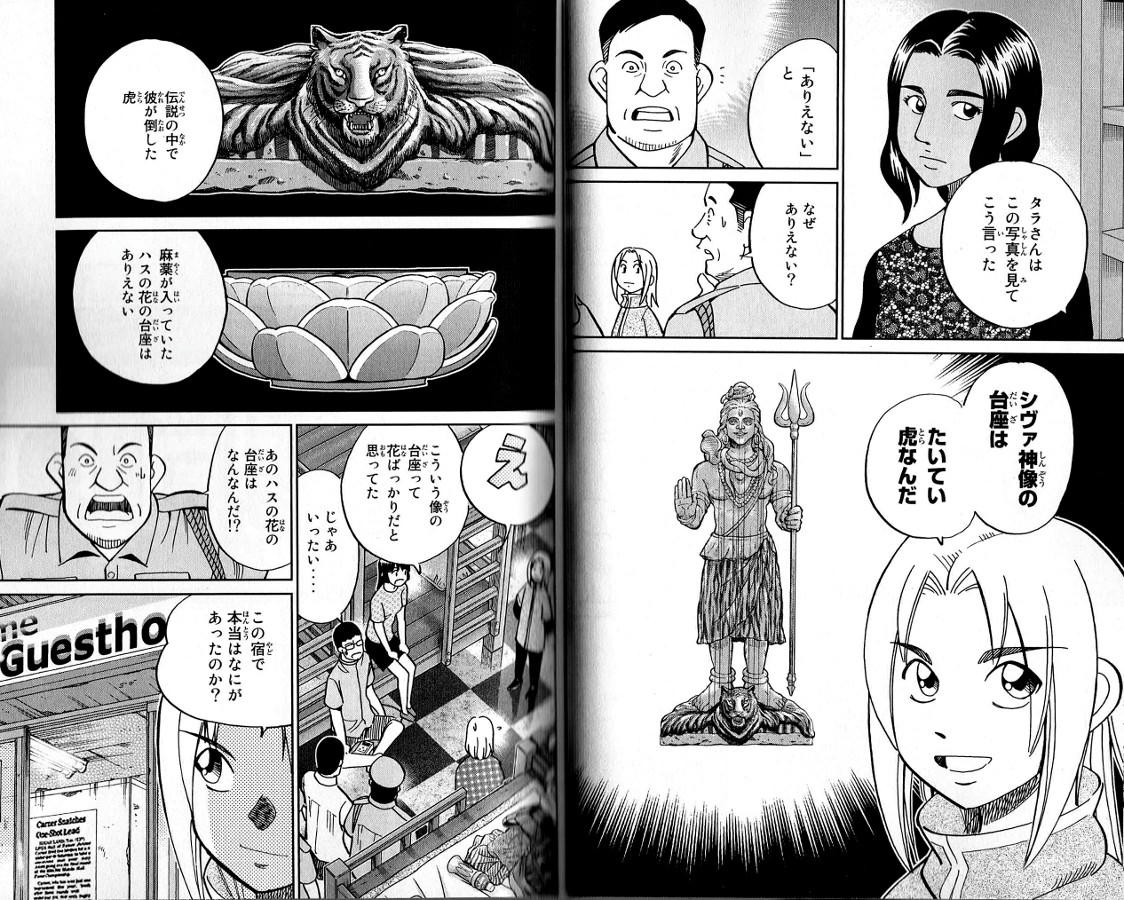
(Shinra explains to the police what it is that Tara finds unbelievable.)
Domitori- (Dormitory, 2017, Monthly Shonen Magajin)
A group of backpackers in Thailand are talking with each other in a guest house and showing off the souvenirs they've bought (carved wooden statues of Shiva, Vishnu and Hanuman), all thinking that these are unique local talismans, while the Indian tourist, Tara Boyd, keeps correcting them. The group consists of Seiyuu Tsunoda (Japan), Ben Craft (Australia), Kwan Ryu (Taiwan), Tara, and Scott Koba (Switzerland). The Thai police raid the guest house on the rumor that someone is dealing drugs there, and one of the cops finds a plastic bag with white powder in the hollowed space in Seiyuu's statue. He's hauled off, and Tara and Kwan stake out the Japanese embassy in order to find someone that can help their acquaintance. Shinra and Tatsuki step out with one of the embassy staff as Shinra is being thanked for helping them with a separate problem. The two women grab them and drag the heroes to the police station, where Seiyuu begs for help (the penalty for selling drugs in Thailand is very severe, and Seiyuu claims to be innocent). Shinra gathers everyone's stories. At the time of the raid, Seiyuu had been in the men's dorm room, putting his statue in its box and then in his bag. He heard Scott yell out and fall in front of the hallway door as if being pushed, and went to the doorway to help. There was no one else behind him, but Seiyuu was now in full view of the police that were searching the women's belongings. The police said that Seiyuu was obviously trying to run away, and when they looked in his bag, they found the statue, and drugs in the hollow base.
The only other possible suspect would be Ryan, the American. He played poker with Scott and Seiyuu and lost big money. He left the dorm right after, but he was obviously a druggie and could have planted the stash in Seiyuu's statue in revenge. The problem with that theory is that Immigrations has records showing that Ryan had left the country before Seiyuu bought his souvenir. The only real cue is that Tara saw the photos the police took of the evidence, and there's something she finds unbelievable.
Questions: Did Ryan frame Seiyuu, and if so, how? If not, is Seiyuu really guilty of smuggling? Who pushed Scott and why didn't anyone see him or her? And, what is Tara having so much difficulty believing?
Natural history: A short description of the Hindu gods, and how various religions co-opt each other.
Payment: Shinra might have gotten Seiyuu's Shiva statue.
--- Spoilers ---
If you guessed that Scott is lying, you're right. Scott's the one that had been dealing from the guest house, and Ryan had been one of his customers. However, when Ryan lost most of his money to Seiyuu and Scott in the poker game, he got angry and phoned in an anonymous tip to the police before leaving the country. One of Scott's snitches had informed him of the impending raid, and when he saw that Seiyuu had gotten a similar statue, he'd switched bases when Seiyuu wasn't looking. The police took photos of the evidence, and Tara noticed that the Shiva statue had a flower base, and not the normal crouching tiger. So, Scott is the obvious culprit. Seiyuu is released, but Shinra reminds him that the thrills and dangers of the unknown are the main reasons anyone goes backpacking around the world on their own, so part of the problems he'd just faced are his own fault. Note that most of the discussions of hiding things revolve around having the statue itself hollow, but the drugs are found in the one wooden base, which was almost never shown in the bulk of the chapter, which was intentionally misleading.
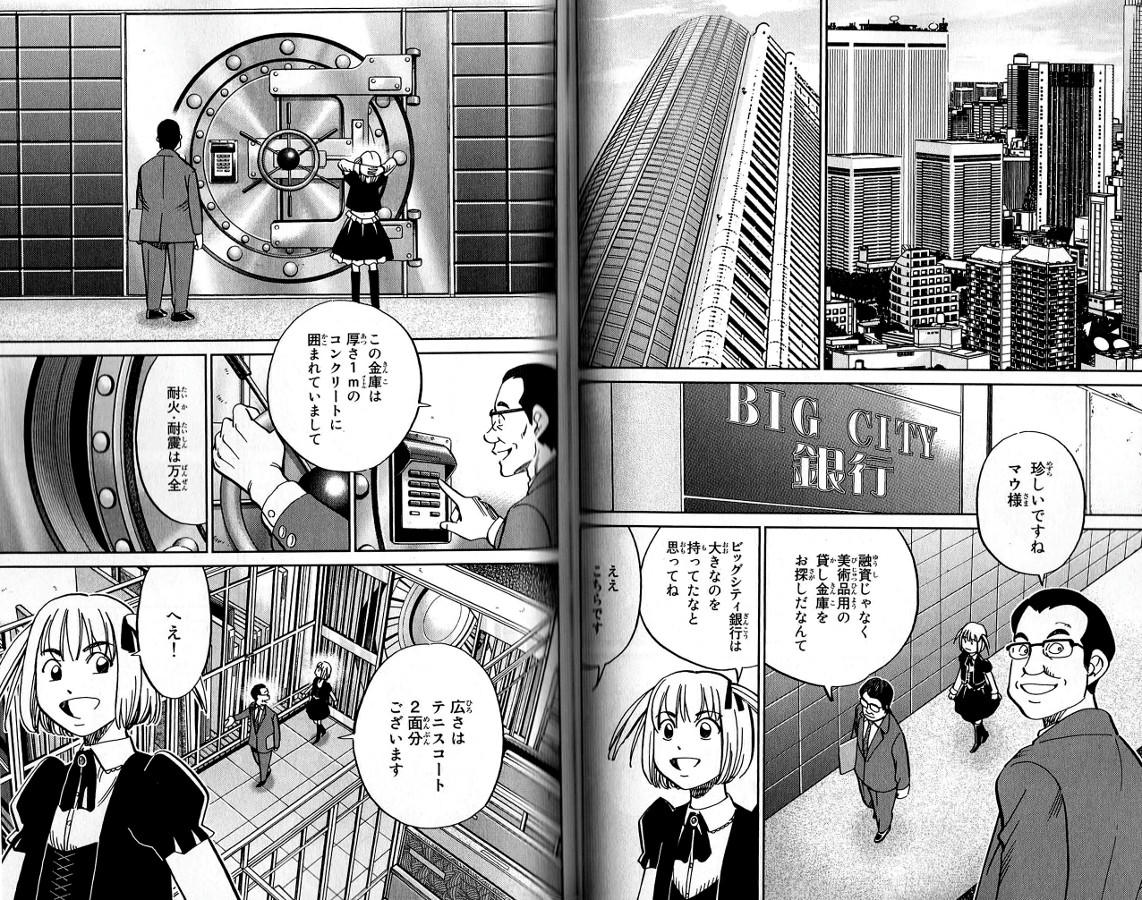
(Mau visits the vaults at Tokyo Big City Bank.)
Kurisumasu no Mau (Mau at Christmas, 2017, Monthly Shonen Magajin)
Mau is back, and has two intertwined storylines. The first regards a huge trove of art collectibles that a German estate wants her to sell on their behalf, and she gets to keep 40% of whatever they go for (she expects maybe $32 million). Second is that Interpol is on her case again for dealing in stolen goods. Seems that a Gauguin painting Mau had sold to a notorious Mexican drug lord had been part of a shipment being sent to a museum. The truck was hijacked and the painting stolen. Interpol wants to know if she's involved. From here, the main focus is on Mau's preparations for receiving the German art collection and finding the highest bidders for it, while also deciding whether to move her other inventory into a bank vault. She sends her main warehouse manager, Joseph, to London to get an insurance company to sell her a policy for her full collection. She has a hapless minion, Ryuuen, go to Mexico to meet with David, the drug lord, and she herself goes to Big City Bank in Tokyo to rent vault space. But, she seems to be doing everything all wrong. Joseph is instructed to pay 30,000 pounds on a 130,000 pound policy. She's trying to get the bank to give her most of its vault space for free, and David is about to put a bullet into Ryuuen for his insolence in telling David to buy everything in the German collection at full value.
Questions: Is Mau insane? Do all her people die?
Natural history: Just a little information on money laundering, and Gauguin.
Payment: Mau tries to sell a Celtic cross to Shinra.
Note: The Mexican drug lord's name is given in katakana as "Dabito", which I'm treating as "David."
--- Spoilers ---
Mau is actually killing two birds with one stone. Her group puts ultraviolet bar codes on all their shipping containers, a fact that no one else knows about. She went to the bank she'd worked with for the Gauguin transaction, and located the crate that had the stolen painting in it (it was suspicious that with a truck filled with art going to a museum that the thieves knew exactly which one box to take). And, there's the fact that the insurance company was so quick in paying $100 million for David's insurance policy when they refused to take Mau's reduced offer on her policy, and she's a better customer for them. Conclusion - David has a lot of money from his drug dealings but no way to get it into circulation. So, he buys the Gauguin from Mau, gets it over-insured, fakes the theft, and lets the bank keep the painting. The insurance company pays him $100 million, which he CAN now spend, and the bank pays the insurer $100 million in a kickback - everyone wins.
Except that Mau holds all the evidence, and she wants her cut. The insurer gives her cheap insurance, the bank gives her cheap vault space, and David buys the entire German collection at full value. All except one piece, a Celtic cross that Mau tries to sell to Shinra.
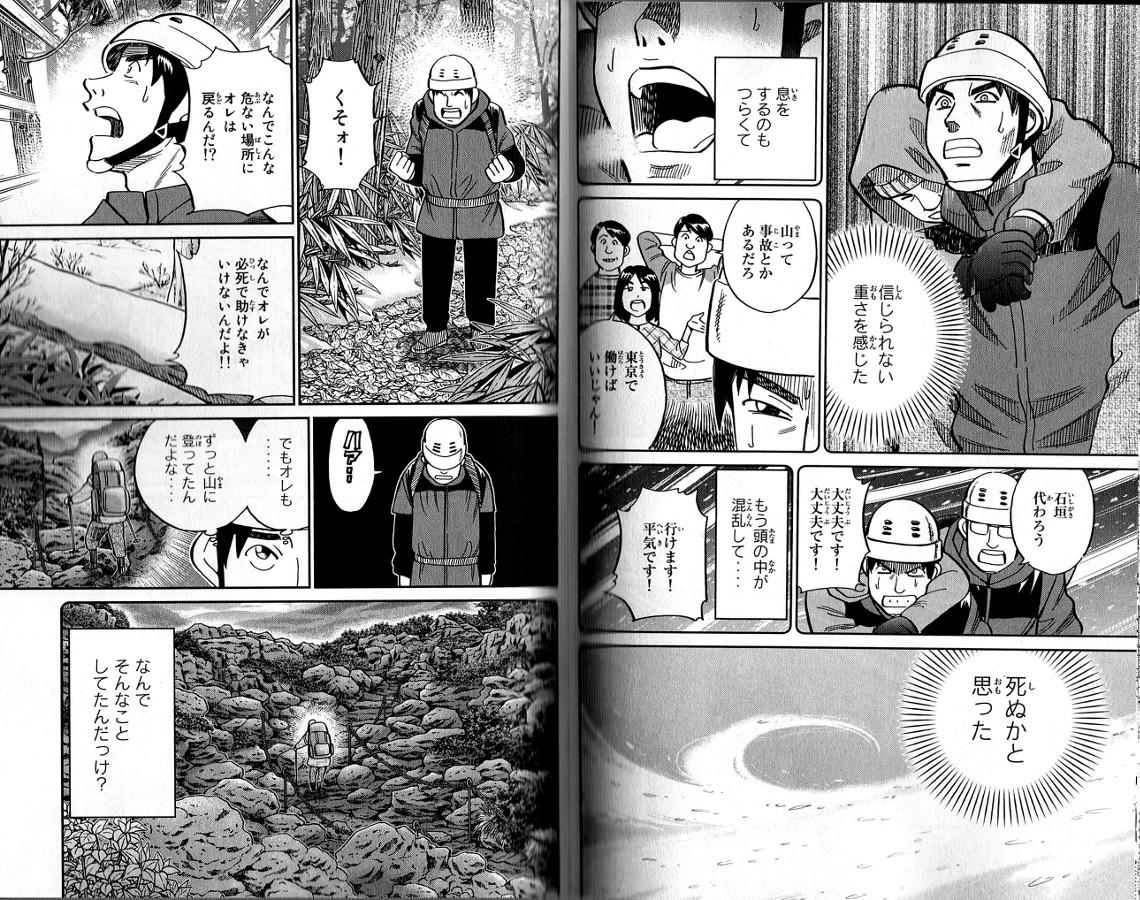
(Ryouta suffered during the rescue training the day before, and is now afraid of dying outside, alone.)
Donguri to Matsubokkuri (Acorn and Pinecone, 2017, Monthly Shonen Magajin)
Tatsuki and Shinra go out to a mountain in the Japanese Alps for some sledding (same place Tatsuki's grandfather is at for the hot spring spas). Nearby, Ryouta Ishigaki is a new member of the mountain rescue services. He'd undergone some severe rescue training the day before, and his body is trembling. A call comes in that the leader of a school hiking team at the top of a mountain has been injured and the group needs to be evacuated. The rest of the service members leave to do the rescue, telling Ryouta to stay behind and rest. However, Ryouta wants to protest and say that he's not shaking because he's exhausted - he's terrified. He'd had to carry a heavy body on his back the day before, and the weight was so great that he'd thought he was going to die. He's scared of dying alone in the wilderness. Then another call comes in - a father and his young son had gone hiking by themselves and the father had gotten lost. He wandered off the trail, and slipped while climbing down a cliff. The boy is with him, and used their cell phone to call for help. The boy, Gaku, is panicking, so Ryouta gets him to describe his surroundings, then calls his squad leader to say that he's going to go get the boy and his father (the leader tells him to be careful).
Ryouta gets to roughly the area described - near a waterfall and river, with a big pit close by - and starts yelling. A man yells back, and Ryouta goes to him. The guy has also fallen and hurt his leg, but he's alone and doesn't have children. Seems that there are a lot of people needing rescuing today, so Ryouta calls his squad leader, who says that they've finished their mission and will try to recon the area, too. Ryouta picks up his guy and is forced to carry him on his back, again. Things are looking grim, until Shinra and Tatsuki happen by and let him use one of their sleds. They get to the rescue hut and the rescue squad radios in that they can't find anyone else in the area around the falls. The boy calls back, getting more panicked. He's surrounded by fog now and can't see any of the landmarks in the area.
Questions: Where is the boy? If he's not near a waterfall, the river below it, or a big pit, where is he? Do he and his father get rescued in time or not? Does Ryouta quit the rescue services?
Natural history: Some discussions of pine cones and hot springs.
No payment?
--- Spoilers ---
Shinra gets on the phone and asks what seems to be irrelevant questions - Are there any power line towers visible? What kind of flowers have you seen. Where was the sun when you last saw it? What direction is the river flowing relative to the sun? What does the fog smell like? In fact, the shapes of the acorns and pine cones the boy saw help place the elevations of the trees in the area at 700 to 800 meters. And the smell - rotten eggs - indicates that the boy is close to a fault line and a hot spa. Looking at a map, Shinra places the boy somewhat farther away from the falls than first thought. The group finds the boy and his father, and then Ryouta is shocked at seeing an optical illusion - it's as if there's a second, new waterfall. In fact, there are two rivers, with the first one, coming from the falls, making a turn behind a hill in the way, and the second river curving on the near side of the hill. Together it looks like there's one, completely different, river running from the falls to the boy's location. Below that spot is a clear pool that's reflecting a cliff face on the other side, and together it looks like a deep pit. Ryouta looks out at the horizon and accepts that nature is dangerous, but also beautiful. Then, the rest of the rescue squad shows up and evacs the boy and his still unconscious father. A little later, Ryouta gets a postcard from Gaku, saying that his father is getting better, and that his mother is really angry at them. Then, the squad captain orders him out for more drills.
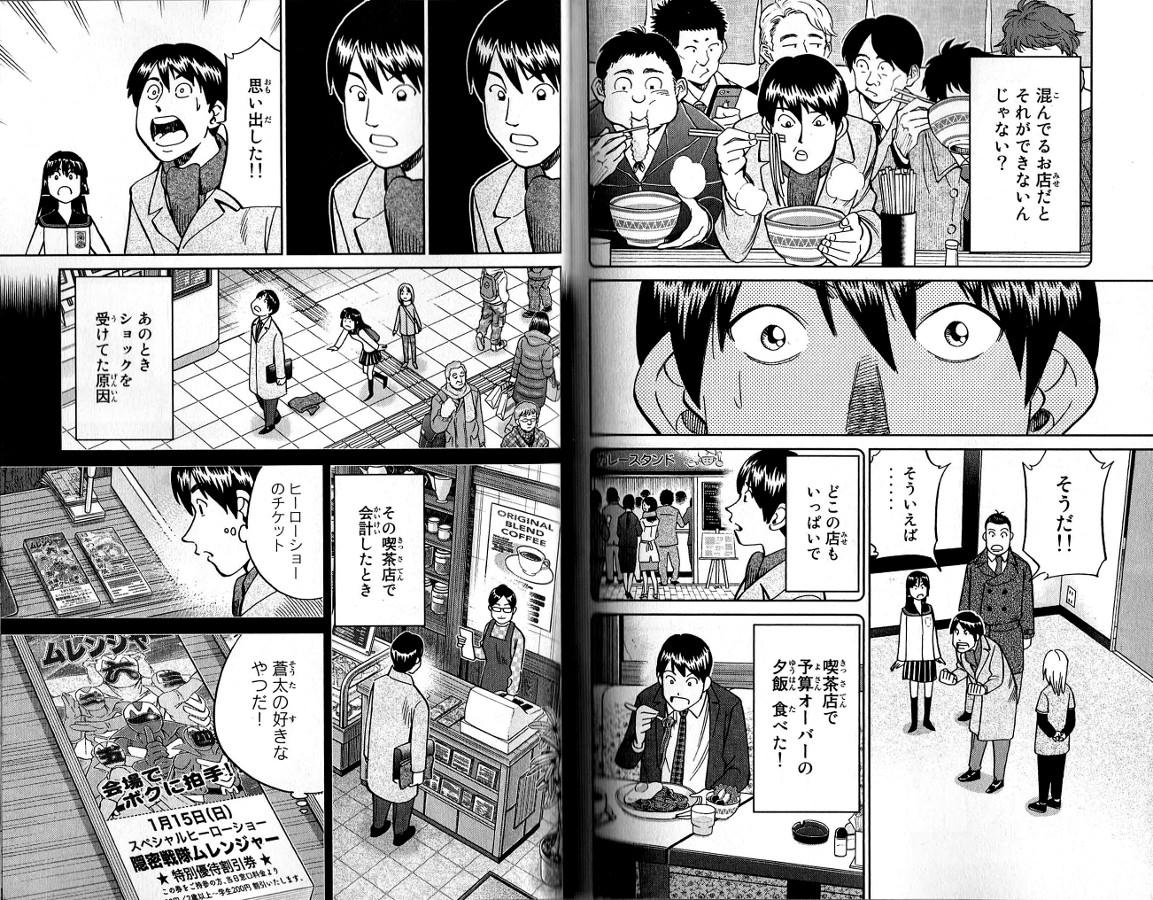
(Seiichi remembers going out to eat.)
Aribai (Alibi, 2017, Monthly Shonen Magajin)
Seiichi Mikeno is a salaryman in a bind. His boss wants him to work unpaid overtime and/or get sent off to an office in another city, while his wife wants him to stay home and spend more time playing catchball with their young son so he'll become a better softball player. It doesn't help that the family really needs money. One morning, as he prepares to go to work, a pair of police detectives grab him and take him to HQ for questioning. Seems that one Daisuke Hachiware, a loan officer, was strangled to death in Seiichi's building 2 weeks earlier, at a time of evening (7 PM) when Seiichi was the only one still there (excluding the night guard who was on security camera all night). Apparently, a group of office workers in the next building over had been leaving for the night at 6:30 PM and had noticed that a conference room still had its lights on, although the room was empty. They reported it to the night guard, who then went to that room and found Daisuke dead on the floor. The police believe that Seiichi killed Daisukei for turning down a loan request, then dragged the body to the conference room between 6:30 and 7 PM. They ask him where he was at that time, and Seiichi can't remember. It was two weeks ago, and his mind is a blank. He tells them that Daisuke always wore a flashy white fur coat and had his hair bleached fashionably blond, so he was probably mugged for his money, but the detectives don't budge. They let him go for the day, but demand that he give his whereabouts at the time of the murder or face charges.
In a funk, Seiichi notices that he's holding his muffler, and that 2 weeks ago there was a girl near the train station that had handed it to him. He goes to the station for clues, and spots Tatsuki. He corners her, and she says that he'd been in a daze at the time 2 weeks ago, and had dropped his muffler on the ground. She'd picked it up and given it back to him. Shinra gets him to explain what's going on, and he decides to help. They find out that Kujirazaki is handling the case, and Tatsuki talks the detective into describing all the evidence. Shinra looks at the ceiling, then says that Kujirazaki will be able to solve the case if he unseals the murder scene.
Questions: What happened that evening? Why can't Seiichi remember anything? Does he have an alibi? If so, who is the real killer?
Natural history: Nothing.
No payment?
--- Spoilers --
The first clue is Seiichi's muffler. Normally, at about 6 PM on a weeknight, he'd go to a ramen shop near the train station, where the customers are standing elbow to elbow. No one would remember him there, but he wouldn't be taking his muffler off to eat in a place like that. But, when he was walking from the station in a daze, he was holding his muffler in his hand, so he must have been in a sit-down restaurant where he'd have taken his muffler off to eat. That's when he finally remembers what happened. He'd gone to a regular cafe because the places near the station were too crowded. At the end of the meal, he saw tickets for a Power Rangers-type stage show near the cash register, and because he knew he was going to be working overtime, and not be home to play with his son, Seiichi told the restaurant owner that he'd buy two tickets for the show. The owner apologized, saying the show had ended its run one month earlier, and it was her fault for not removing the tickets from the register stand. That's when he'd gone into shock. But, the owner remembered him and the time he'd been there, because she was expecting her own son to be coming home from school then and she'd just looked at the clock when he came in. So, that gives Seiichi an alibi. The next day, Kujirazaki unseals the conference room and Shinra hides inside to wait. Eventually, the guy from the next building over that had told the night guard about the conference room lights still being on comes into the room and tries to remove something from the overhead lights. Kujirazaki arrests him, and we learn that the guy had summoned Daisuke Hachiware to the conference room and killed him there. Then he'd put filter sheets on the overhead lights, so that with Daisuke's white coat and blond hair, he'd blend into the coloring of the carpet and the room would look empty from a distance. When the night guard entered the conference room, he'd turned on the main lights, and turned off the dimmer lights, making the body on the floor more visible. But, because the police had sealed the room, the killer wasn't able to return to remove the last of the evidence. The guy curses at getting caught. Some days later, Seiichi and his wife are at the ballpark, watching their son playing outfield. The wife asks if it's ok for him to be here, and he cryptically replies that he was saved by an expired show ticket. Then the batter hits an easy pop fly, and Seiichi's son manages to catch it as Seiichi and his wife cheer.
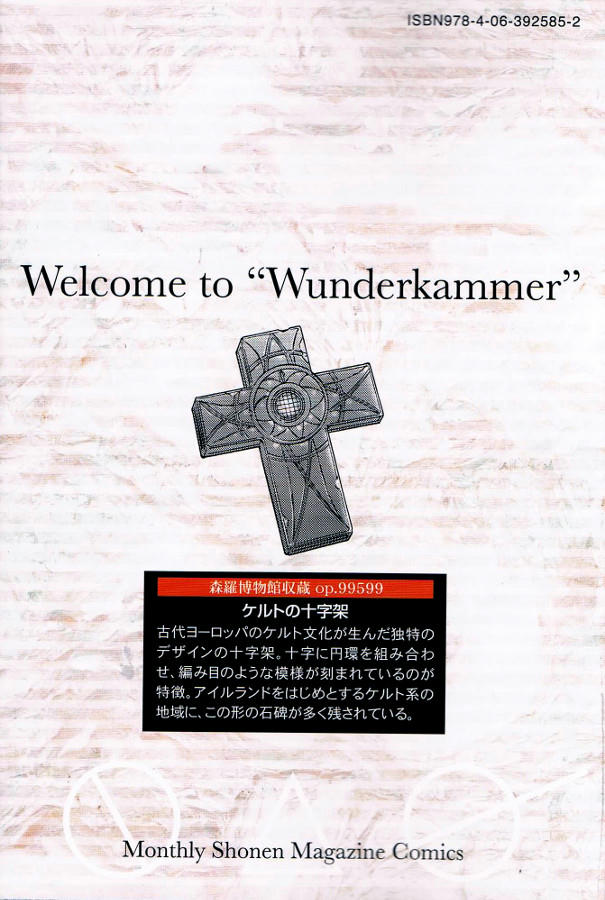
(Celtic Cross)
Summary: To be honest, I liked the science and history-based stories in Q.E.D. iff more this time. The misrepresentation of where the drugs were hidden (in the wooden base, not within the hollowed statue itself), and the portrayal of the one American in the story as a nasty little drug user distracted from the mystery in Dormitory. I always like reading the Mau stories, so Mau at Christmas was a nice respite, but I had trouble figuring out where the story was heading. Acorn and Pinecone was ok, and I did like what little natural science was there in the discussions on what plants grow at what altitudes, and how hot springs are formed. Alibi was a semi-decent fluff piece, but we never get the killer's motive. Overall, this volume is recommended to anyone that likes the series.
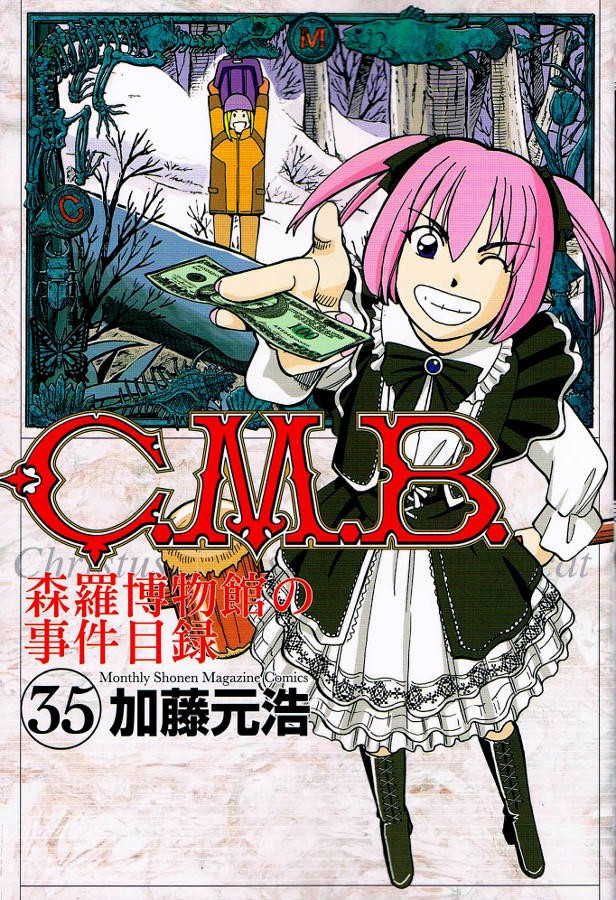




No comments:
Post a Comment